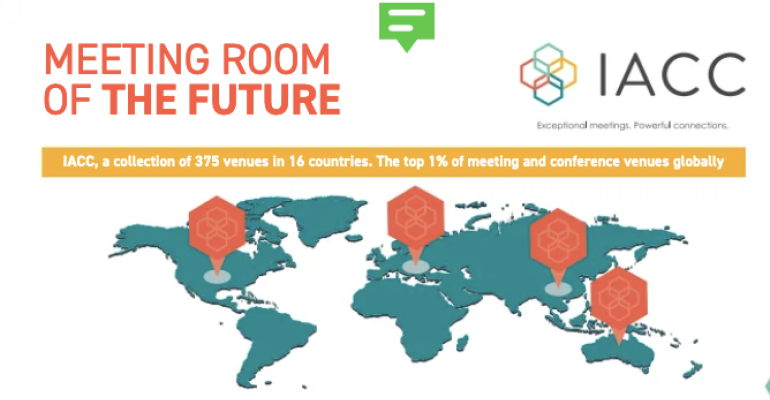According to the 2024 "Meeting Room of the Future" report from the International Association of Conference Centers, enhancing the attendee experience is top of mind for conference-center operators, especially in ways that cater to the younger generations who are becoming more of the audience.
Specifically, creating comfortable conversational environments in prefunction spaces and creating themed food-and-beverage events are among the biggest experience enhancers that venues are providing. Meanwhile, connecting attendees to nature is a priority, while artificial intelligence is gaining traction as a tool for diversifying event menus while driving sustainable practices.
These and other meeting trends were gathered by IACC from 170 venue managers from around the world, providing a wide window into how they are changing their operations to meet the needs of small and mid-sized meeting groups.
Here are four key points found in IACC’s 53-page report:
• 71 percent of venues reported that at least 75 percent of their furniture is conducive to creating flexible layouts inside and outside of meeting rooms. This is largely a result of groups wanting smaller, comfortable gathering pods in breakout rooms as well as prefunction areas.
Further, because most respondents said that groups’ requirements for space design have changed significantly over the past three to five years, more than half said that they presently offer more collaborative spaces outside of formal meeting rooms than they did three years ago. And more than half also said they plan to offer more such space within the next three years.
However, there are hurdles for many venues trying to adapt; 55 percent of respondents said cost of the furniture is an issue, while 49 percent said storage space is an issue. “The downside of this [increased] flexibility is the requirement for more storage space and the access needed to move furniture,” noted Dana Rector, principal, at Rabun Architects, a venue-design firm. “When [facility] budgeting gets tight, storage and circulation are often the first spaces to get cut.” This could result in a greater need for groups to rent some furniture from off site.
• Themed food-and-beverage offerings are the most likely element to be offered to groups to create memorable experiences; 71 percent of respondents said their venues actively offer this meeting element, while another 20 percent said they work with off-site suppliers to offer such experiences to group clients. In addition, 83 percent of respondents said they offer on-site teambuilding activities to enhance the group experience.
• 79 percent of respondents from residential conference centers said they have outdoor meeting or reception spaces, while 58 percent of respondents from non-residential centers said they had such spaces. Some of the ways that venues are encouraging more attendee connection with the outdoors include having walking trails on property, having an inventory of bicycles, and having large windows in meeting spaces that can be opened.
• With technology, 28 percent of respondents said their venues presently offer virtual-reality site tours; 28 percent said they will offer VR site tours within a year; and 44 percent said they do not plan to offer VR site tours in the near future.
On the other hand, 35 percent of respondents said they are looking into using artificial intelligence for menu planning that is more creative and takes into account locally produced offerings, while also providing ideas for minimizing food waste through efficient ordering strategies as well as post-event solutions.




